Cineplex's Accounting Policies: An Analysis of Financial Reporting
VerifiedAdded on 2023/06/09
|8
|1562
|260
Report
AI Summary
This report provides an analysis of Cineplex's accounting concepts and principles, focusing on its compliance with Canadian GAAP and IFRS. It compares Cineplex's accounting policies with those of Air Canada, highlighting similarities in adherence to Canadian GAAP and IFRS standards, as well as differences in revenue recognition and asset impairment due to the distinct nature of their businesses. The report also examines Cineplex's strategic goals and stakeholder interests, emphasizing how accounting policies contribute to the company's financial health and stakeholder wealth. Finally, it discusses the potential impact of Cineplex transitioning to a private company and the subsequent adoption of Accounting Standards for Private Enterprises (ASPE), outlining the relevant ASPE sections for financial reporting.
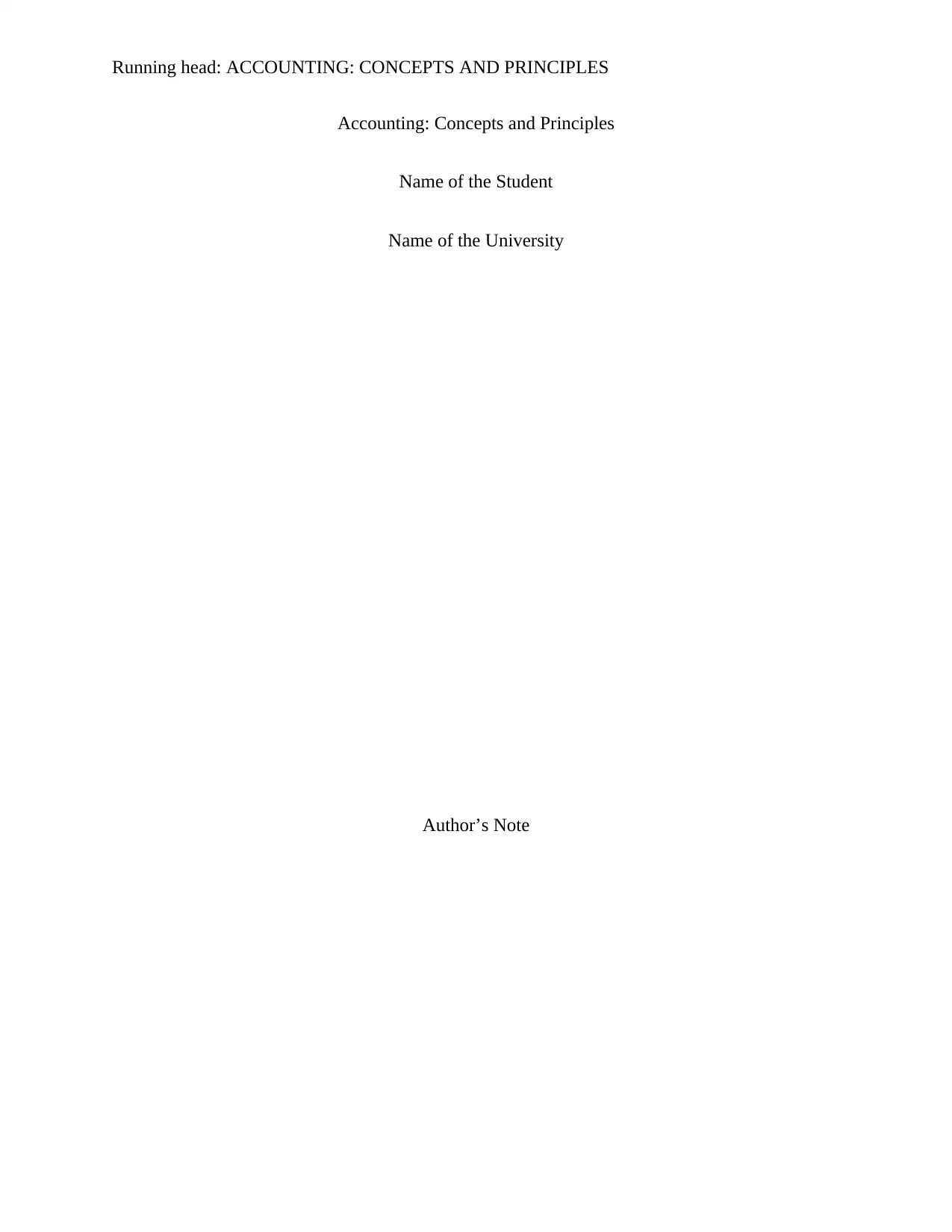
Running head: ACCOUNTING: CONCEPTS AND PRINCIPLES
Accounting: Concepts and Principles
Name of the Student
Name of the University
Author’s Note
Accounting: Concepts and Principles
Name of the Student
Name of the University
Author’s Note
Paraphrase This Document
Need a fresh take? Get an instant paraphrase of this document with our AI Paraphraser
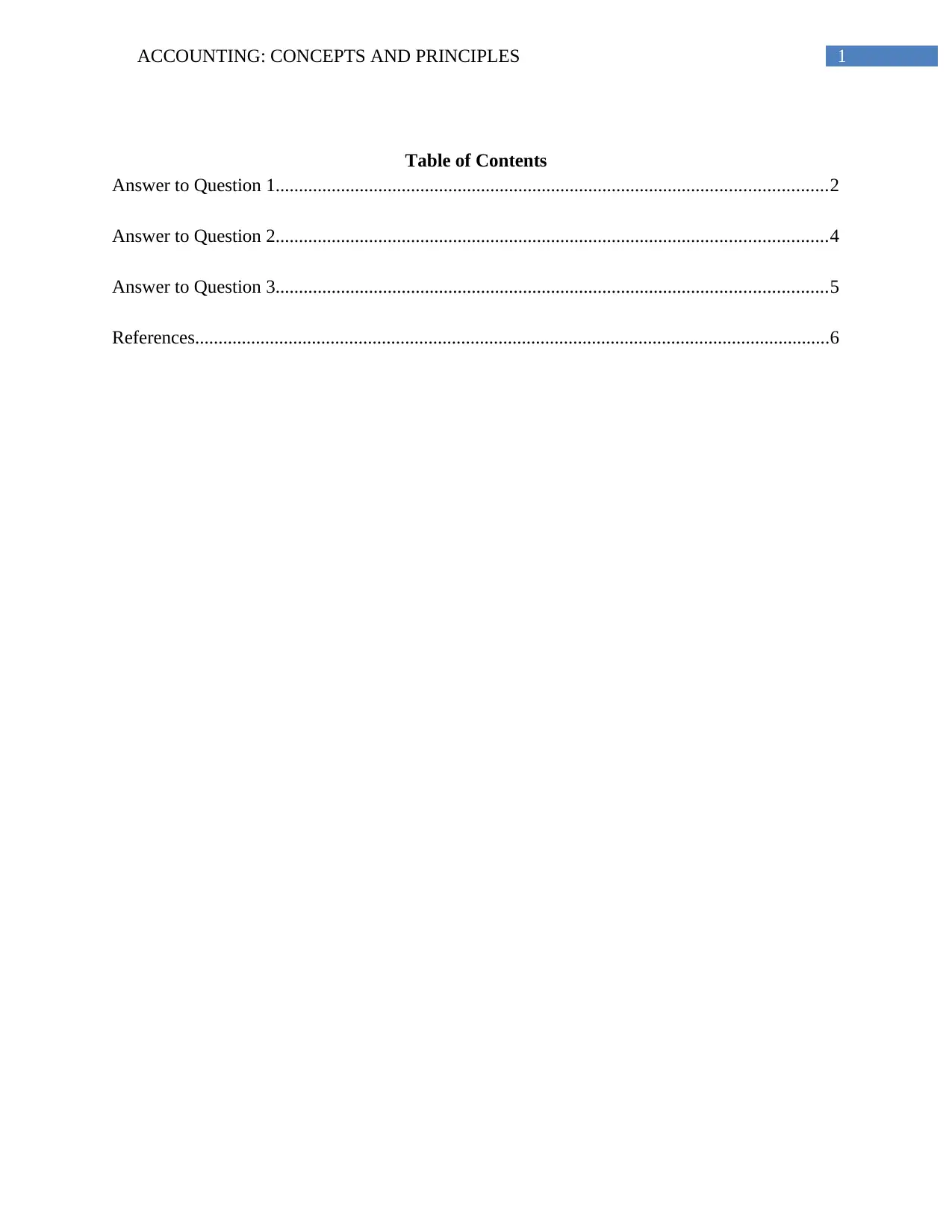
1ACCOUNTING: CONCEPTS AND PRINCIPLES
Table of Contents
Answer to Question 1......................................................................................................................2
Answer to Question 2......................................................................................................................4
Answer to Question 3......................................................................................................................5
References........................................................................................................................................6
Table of Contents
Answer to Question 1......................................................................................................................2
Answer to Question 2......................................................................................................................4
Answer to Question 3......................................................................................................................5
References........................................................................................................................................6
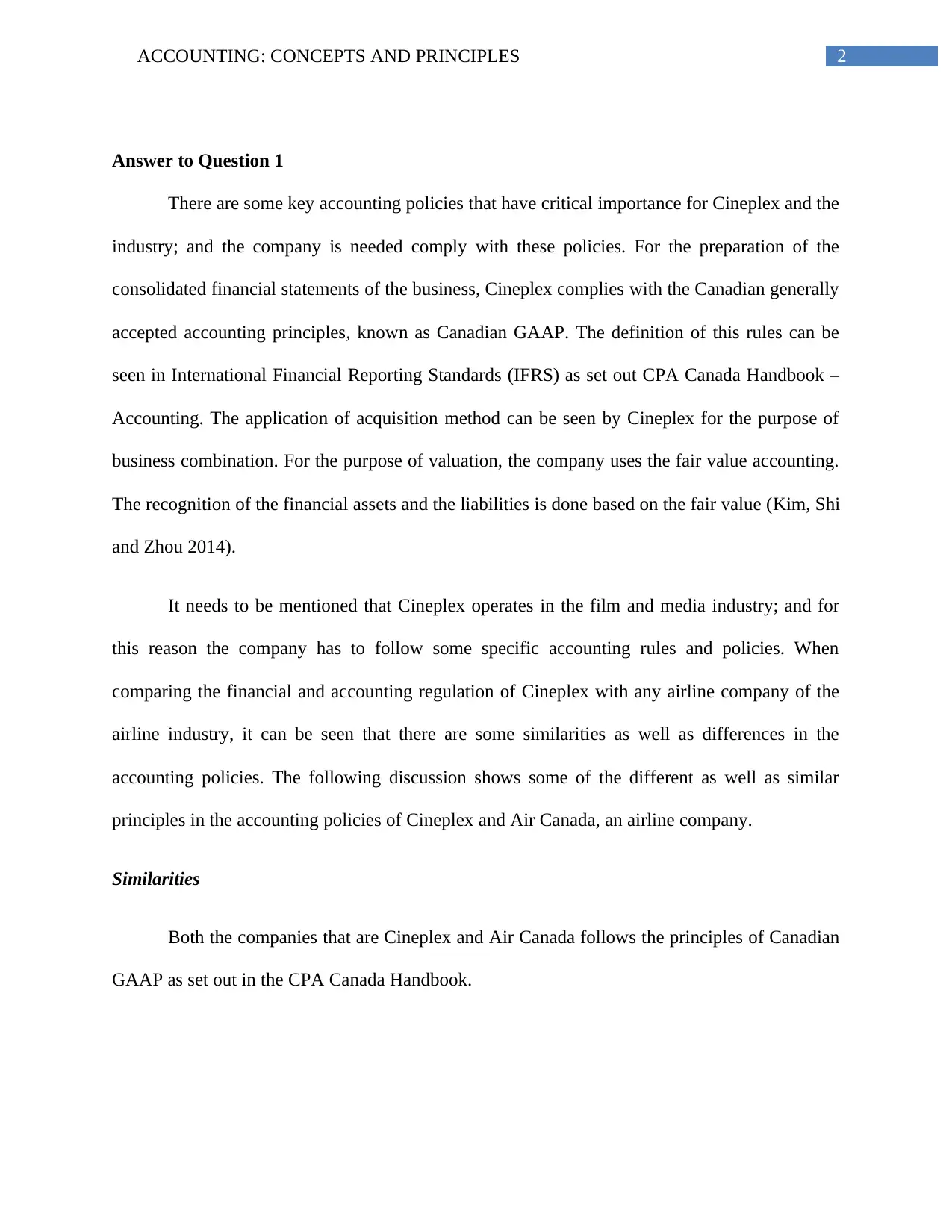
2ACCOUNTING: CONCEPTS AND PRINCIPLES
Answer to Question 1
There are some key accounting policies that have critical importance for Cineplex and the
industry; and the company is needed comply with these policies. For the preparation of the
consolidated financial statements of the business, Cineplex complies with the Canadian generally
accepted accounting principles, known as Canadian GAAP. The definition of this rules can be
seen in International Financial Reporting Standards (IFRS) as set out CPA Canada Handbook –
Accounting. The application of acquisition method can be seen by Cineplex for the purpose of
business combination. For the purpose of valuation, the company uses the fair value accounting.
The recognition of the financial assets and the liabilities is done based on the fair value (Kim, Shi
and Zhou 2014).
It needs to be mentioned that Cineplex operates in the film and media industry; and for
this reason the company has to follow some specific accounting rules and policies. When
comparing the financial and accounting regulation of Cineplex with any airline company of the
airline industry, it can be seen that there are some similarities as well as differences in the
accounting policies. The following discussion shows some of the different as well as similar
principles in the accounting policies of Cineplex and Air Canada, an airline company.
Similarities
Both the companies that are Cineplex and Air Canada follows the principles of Canadian
GAAP as set out in the CPA Canada Handbook.
Answer to Question 1
There are some key accounting policies that have critical importance for Cineplex and the
industry; and the company is needed comply with these policies. For the preparation of the
consolidated financial statements of the business, Cineplex complies with the Canadian generally
accepted accounting principles, known as Canadian GAAP. The definition of this rules can be
seen in International Financial Reporting Standards (IFRS) as set out CPA Canada Handbook –
Accounting. The application of acquisition method can be seen by Cineplex for the purpose of
business combination. For the purpose of valuation, the company uses the fair value accounting.
The recognition of the financial assets and the liabilities is done based on the fair value (Kim, Shi
and Zhou 2014).
It needs to be mentioned that Cineplex operates in the film and media industry; and for
this reason the company has to follow some specific accounting rules and policies. When
comparing the financial and accounting regulation of Cineplex with any airline company of the
airline industry, it can be seen that there are some similarities as well as differences in the
accounting policies. The following discussion shows some of the different as well as similar
principles in the accounting policies of Cineplex and Air Canada, an airline company.
Similarities
Both the companies that are Cineplex and Air Canada follows the principles of Canadian
GAAP as set out in the CPA Canada Handbook.
⊘ This is a preview!⊘
Do you want full access?
Subscribe today to unlock all pages.

Trusted by 1+ million students worldwide
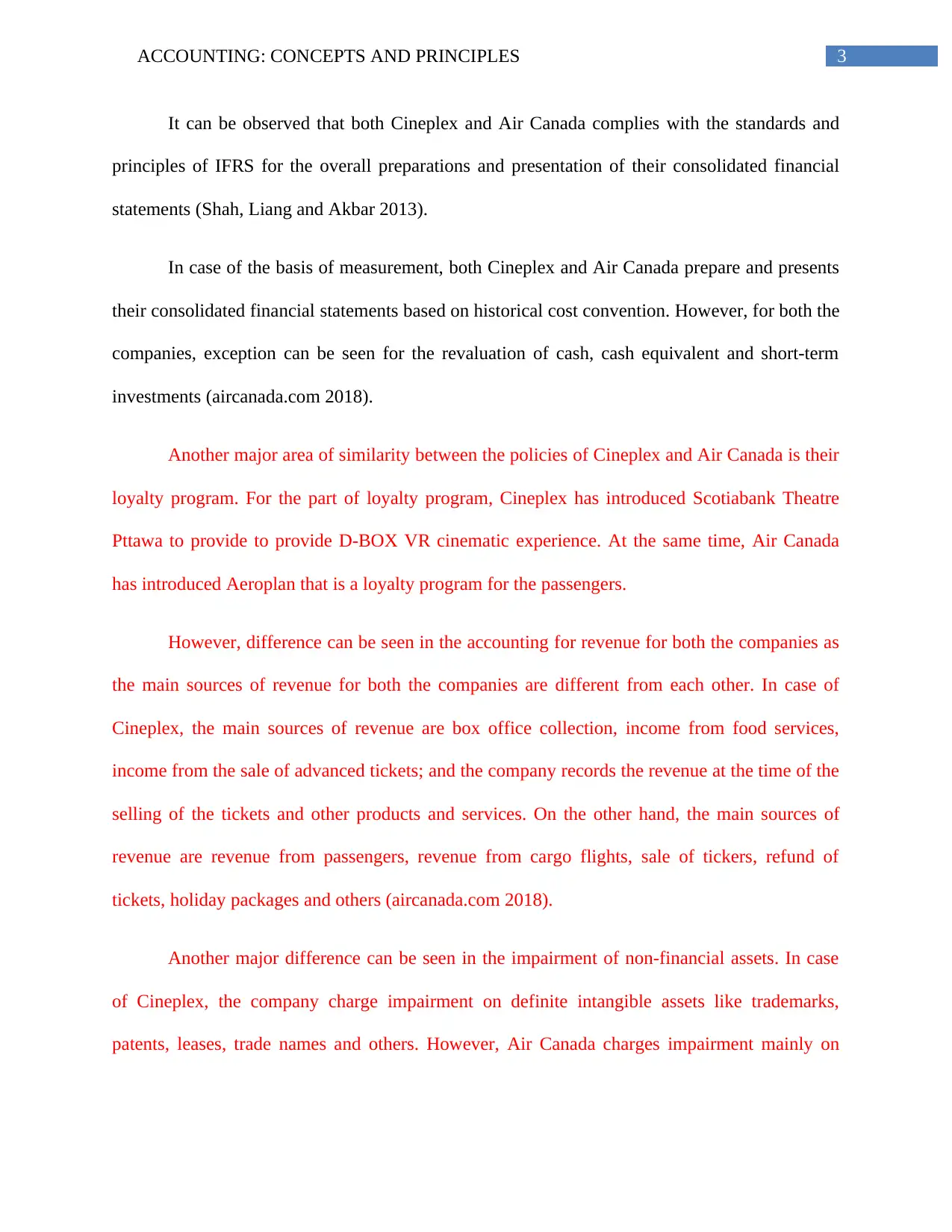
3ACCOUNTING: CONCEPTS AND PRINCIPLES
It can be observed that both Cineplex and Air Canada complies with the standards and
principles of IFRS for the overall preparations and presentation of their consolidated financial
statements (Shah, Liang and Akbar 2013).
In case of the basis of measurement, both Cineplex and Air Canada prepare and presents
their consolidated financial statements based on historical cost convention. However, for both the
companies, exception can be seen for the revaluation of cash, cash equivalent and short-term
investments (aircanada.com 2018).
Another major area of similarity between the policies of Cineplex and Air Canada is their
loyalty program. For the part of loyalty program, Cineplex has introduced Scotiabank Theatre
Pttawa to provide to provide D-BOX VR cinematic experience. At the same time, Air Canada
has introduced Aeroplan that is a loyalty program for the passengers.
However, difference can be seen in the accounting for revenue for both the companies as
the main sources of revenue for both the companies are different from each other. In case of
Cineplex, the main sources of revenue are box office collection, income from food services,
income from the sale of advanced tickets; and the company records the revenue at the time of the
selling of the tickets and other products and services. On the other hand, the main sources of
revenue are revenue from passengers, revenue from cargo flights, sale of tickers, refund of
tickets, holiday packages and others (aircanada.com 2018).
Another major difference can be seen in the impairment of non-financial assets. In case
of Cineplex, the company charge impairment on definite intangible assets like trademarks,
patents, leases, trade names and others. However, Air Canada charges impairment mainly on
It can be observed that both Cineplex and Air Canada complies with the standards and
principles of IFRS for the overall preparations and presentation of their consolidated financial
statements (Shah, Liang and Akbar 2013).
In case of the basis of measurement, both Cineplex and Air Canada prepare and presents
their consolidated financial statements based on historical cost convention. However, for both the
companies, exception can be seen for the revaluation of cash, cash equivalent and short-term
investments (aircanada.com 2018).
Another major area of similarity between the policies of Cineplex and Air Canada is their
loyalty program. For the part of loyalty program, Cineplex has introduced Scotiabank Theatre
Pttawa to provide to provide D-BOX VR cinematic experience. At the same time, Air Canada
has introduced Aeroplan that is a loyalty program for the passengers.
However, difference can be seen in the accounting for revenue for both the companies as
the main sources of revenue for both the companies are different from each other. In case of
Cineplex, the main sources of revenue are box office collection, income from food services,
income from the sale of advanced tickets; and the company records the revenue at the time of the
selling of the tickets and other products and services. On the other hand, the main sources of
revenue are revenue from passengers, revenue from cargo flights, sale of tickers, refund of
tickets, holiday packages and others (aircanada.com 2018).
Another major difference can be seen in the impairment of non-financial assets. In case
of Cineplex, the company charge impairment on definite intangible assets like trademarks,
patents, leases, trade names and others. However, Air Canada charges impairment mainly on
Paraphrase This Document
Need a fresh take? Get an instant paraphrase of this document with our AI Paraphraser
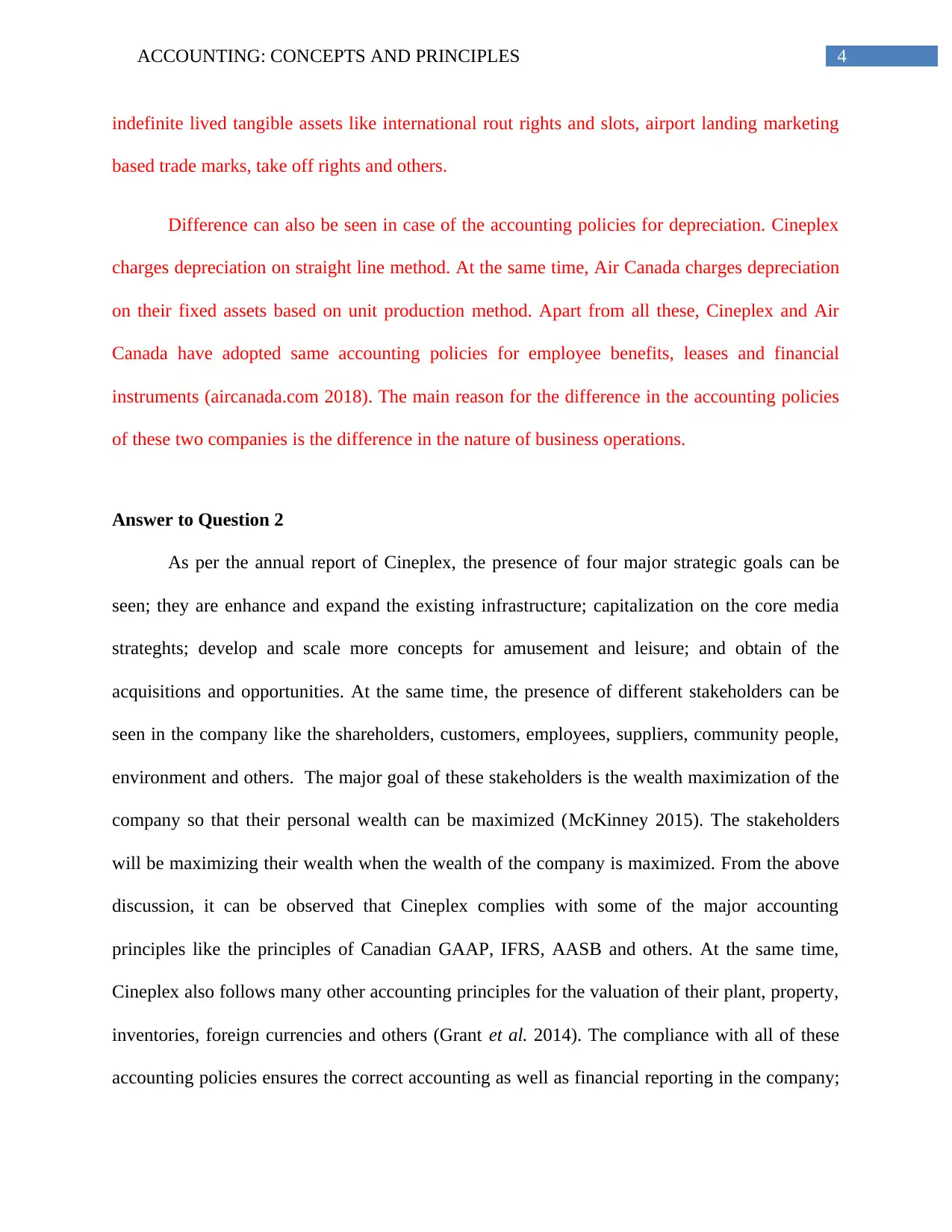
4ACCOUNTING: CONCEPTS AND PRINCIPLES
indefinite lived tangible assets like international rout rights and slots, airport landing marketing
based trade marks, take off rights and others.
Difference can also be seen in case of the accounting policies for depreciation. Cineplex
charges depreciation on straight line method. At the same time, Air Canada charges depreciation
on their fixed assets based on unit production method. Apart from all these, Cineplex and Air
Canada have adopted same accounting policies for employee benefits, leases and financial
instruments (aircanada.com 2018). The main reason for the difference in the accounting policies
of these two companies is the difference in the nature of business operations.
Answer to Question 2
As per the annual report of Cineplex, the presence of four major strategic goals can be
seen; they are enhance and expand the existing infrastructure; capitalization on the core media
strateghts; develop and scale more concepts for amusement and leisure; and obtain of the
acquisitions and opportunities. At the same time, the presence of different stakeholders can be
seen in the company like the shareholders, customers, employees, suppliers, community people,
environment and others. The major goal of these stakeholders is the wealth maximization of the
company so that their personal wealth can be maximized (McKinney 2015). The stakeholders
will be maximizing their wealth when the wealth of the company is maximized. From the above
discussion, it can be observed that Cineplex complies with some of the major accounting
principles like the principles of Canadian GAAP, IFRS, AASB and others. At the same time,
Cineplex also follows many other accounting principles for the valuation of their plant, property,
inventories, foreign currencies and others (Grant et al. 2014). The compliance with all of these
accounting policies ensures the correct accounting as well as financial reporting in the company;
indefinite lived tangible assets like international rout rights and slots, airport landing marketing
based trade marks, take off rights and others.
Difference can also be seen in case of the accounting policies for depreciation. Cineplex
charges depreciation on straight line method. At the same time, Air Canada charges depreciation
on their fixed assets based on unit production method. Apart from all these, Cineplex and Air
Canada have adopted same accounting policies for employee benefits, leases and financial
instruments (aircanada.com 2018). The main reason for the difference in the accounting policies
of these two companies is the difference in the nature of business operations.
Answer to Question 2
As per the annual report of Cineplex, the presence of four major strategic goals can be
seen; they are enhance and expand the existing infrastructure; capitalization on the core media
strateghts; develop and scale more concepts for amusement and leisure; and obtain of the
acquisitions and opportunities. At the same time, the presence of different stakeholders can be
seen in the company like the shareholders, customers, employees, suppliers, community people,
environment and others. The major goal of these stakeholders is the wealth maximization of the
company so that their personal wealth can be maximized (McKinney 2015). The stakeholders
will be maximizing their wealth when the wealth of the company is maximized. From the above
discussion, it can be observed that Cineplex complies with some of the major accounting
principles like the principles of Canadian GAAP, IFRS, AASB and others. At the same time,
Cineplex also follows many other accounting principles for the valuation of their plant, property,
inventories, foreign currencies and others (Grant et al. 2014). The compliance with all of these
accounting policies ensures the correct accounting as well as financial reporting in the company;
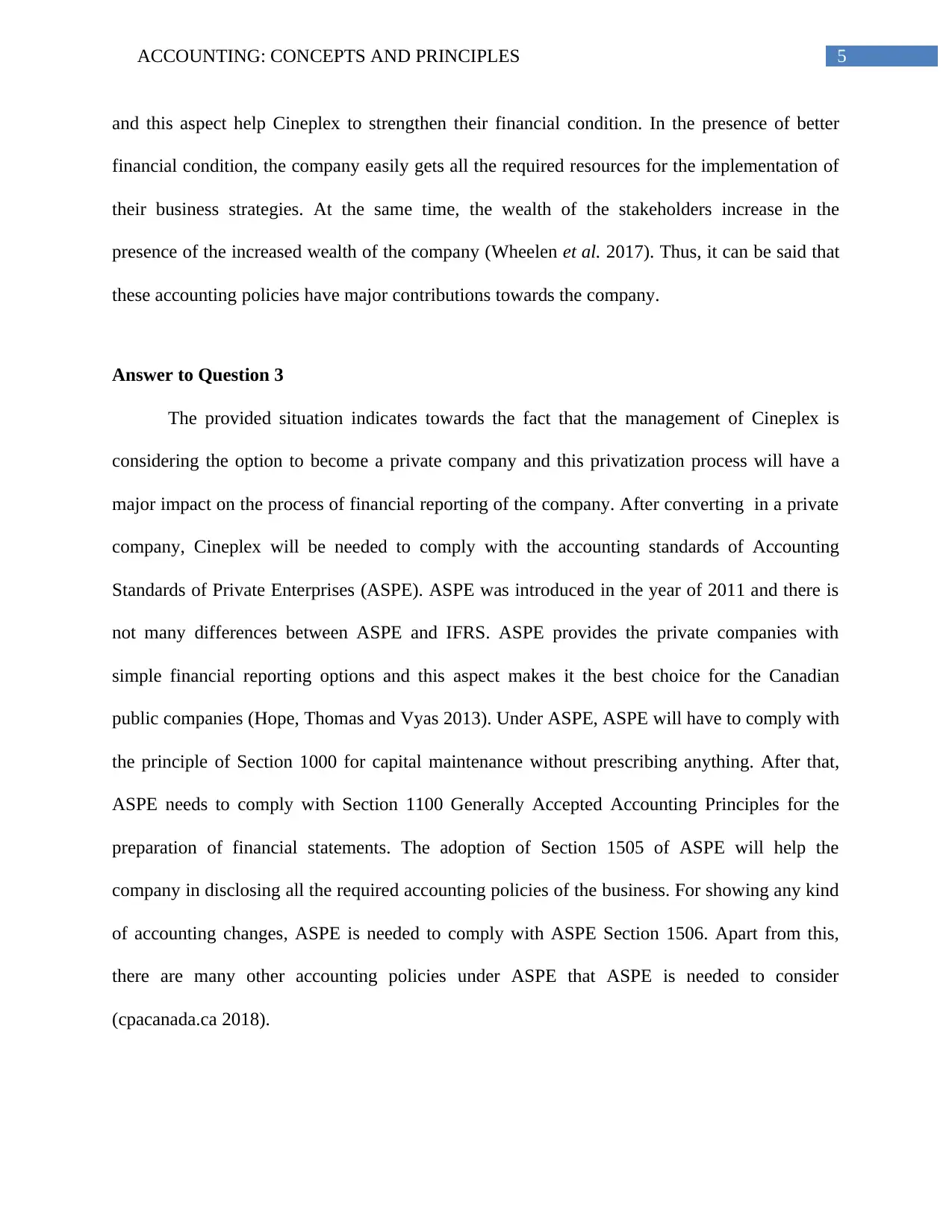
5ACCOUNTING: CONCEPTS AND PRINCIPLES
and this aspect help Cineplex to strengthen their financial condition. In the presence of better
financial condition, the company easily gets all the required resources for the implementation of
their business strategies. At the same time, the wealth of the stakeholders increase in the
presence of the increased wealth of the company (Wheelen et al. 2017). Thus, it can be said that
these accounting policies have major contributions towards the company.
Answer to Question 3
The provided situation indicates towards the fact that the management of Cineplex is
considering the option to become a private company and this privatization process will have a
major impact on the process of financial reporting of the company. After converting in a private
company, Cineplex will be needed to comply with the accounting standards of Accounting
Standards of Private Enterprises (ASPE). ASPE was introduced in the year of 2011 and there is
not many differences between ASPE and IFRS. ASPE provides the private companies with
simple financial reporting options and this aspect makes it the best choice for the Canadian
public companies (Hope, Thomas and Vyas 2013). Under ASPE, ASPE will have to comply with
the principle of Section 1000 for capital maintenance without prescribing anything. After that,
ASPE needs to comply with Section 1100 Generally Accepted Accounting Principles for the
preparation of financial statements. The adoption of Section 1505 of ASPE will help the
company in disclosing all the required accounting policies of the business. For showing any kind
of accounting changes, ASPE is needed to comply with ASPE Section 1506. Apart from this,
there are many other accounting policies under ASPE that ASPE is needed to consider
(cpacanada.ca 2018).
and this aspect help Cineplex to strengthen their financial condition. In the presence of better
financial condition, the company easily gets all the required resources for the implementation of
their business strategies. At the same time, the wealth of the stakeholders increase in the
presence of the increased wealth of the company (Wheelen et al. 2017). Thus, it can be said that
these accounting policies have major contributions towards the company.
Answer to Question 3
The provided situation indicates towards the fact that the management of Cineplex is
considering the option to become a private company and this privatization process will have a
major impact on the process of financial reporting of the company. After converting in a private
company, Cineplex will be needed to comply with the accounting standards of Accounting
Standards of Private Enterprises (ASPE). ASPE was introduced in the year of 2011 and there is
not many differences between ASPE and IFRS. ASPE provides the private companies with
simple financial reporting options and this aspect makes it the best choice for the Canadian
public companies (Hope, Thomas and Vyas 2013). Under ASPE, ASPE will have to comply with
the principle of Section 1000 for capital maintenance without prescribing anything. After that,
ASPE needs to comply with Section 1100 Generally Accepted Accounting Principles for the
preparation of financial statements. The adoption of Section 1505 of ASPE will help the
company in disclosing all the required accounting policies of the business. For showing any kind
of accounting changes, ASPE is needed to comply with ASPE Section 1506. Apart from this,
there are many other accounting policies under ASPE that ASPE is needed to consider
(cpacanada.ca 2018).
⊘ This is a preview!⊘
Do you want full access?
Subscribe today to unlock all pages.

Trusted by 1+ million students worldwide
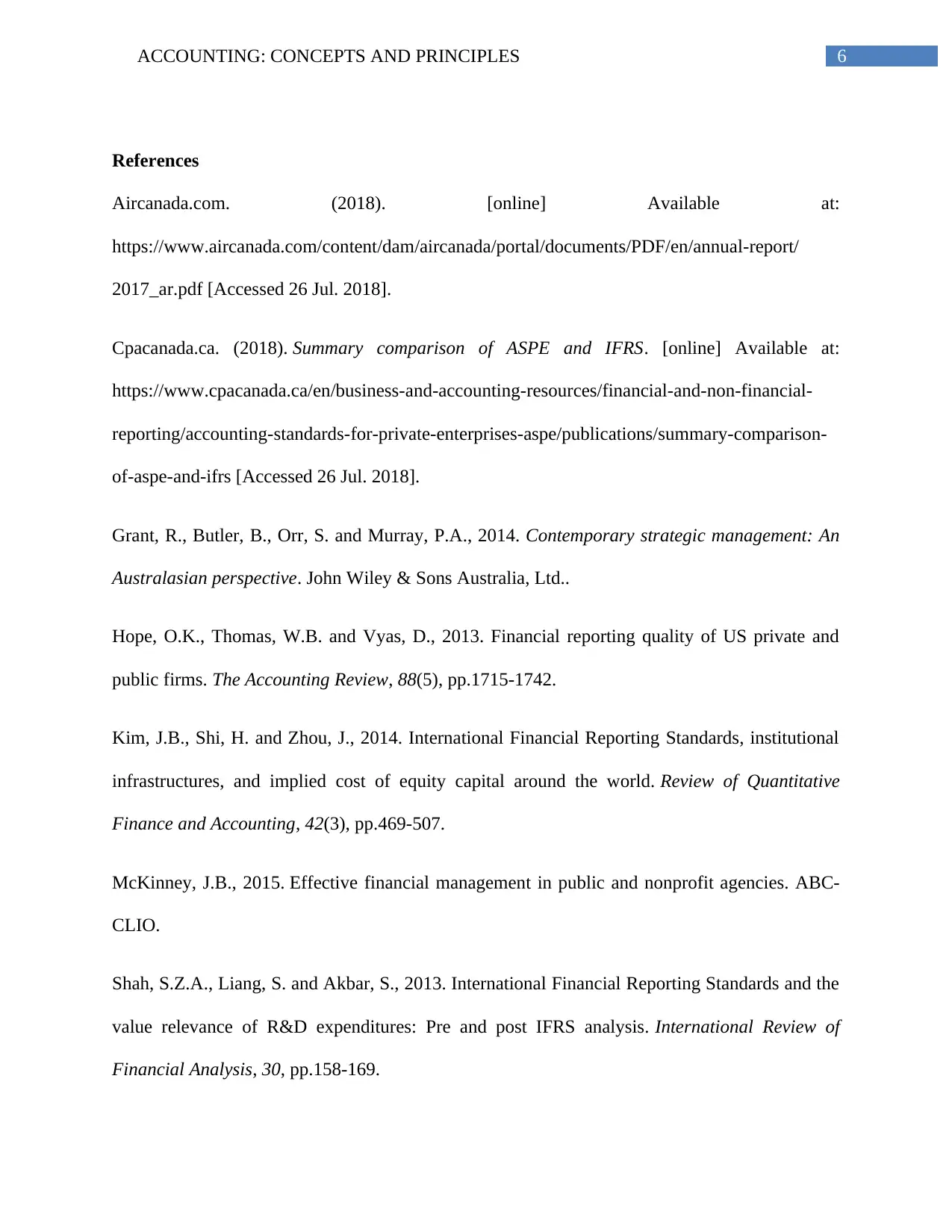
6ACCOUNTING: CONCEPTS AND PRINCIPLES
References
Aircanada.com. (2018). [online] Available at:
https://www.aircanada.com/content/dam/aircanada/portal/documents/PDF/en/annual-report/
2017_ar.pdf [Accessed 26 Jul. 2018].
Cpacanada.ca. (2018). Summary comparison of ASPE and IFRS. [online] Available at:
https://www.cpacanada.ca/en/business-and-accounting-resources/financial-and-non-financial-
reporting/accounting-standards-for-private-enterprises-aspe/publications/summary-comparison-
of-aspe-and-ifrs [Accessed 26 Jul. 2018].
Grant, R., Butler, B., Orr, S. and Murray, P.A., 2014. Contemporary strategic management: An
Australasian perspective. John Wiley & Sons Australia, Ltd..
Hope, O.K., Thomas, W.B. and Vyas, D., 2013. Financial reporting quality of US private and
public firms. The Accounting Review, 88(5), pp.1715-1742.
Kim, J.B., Shi, H. and Zhou, J., 2014. International Financial Reporting Standards, institutional
infrastructures, and implied cost of equity capital around the world. Review of Quantitative
Finance and Accounting, 42(3), pp.469-507.
McKinney, J.B., 2015. Effective financial management in public and nonprofit agencies. ABC-
CLIO.
Shah, S.Z.A., Liang, S. and Akbar, S., 2013. International Financial Reporting Standards and the
value relevance of R&D expenditures: Pre and post IFRS analysis. International Review of
Financial Analysis, 30, pp.158-169.
References
Aircanada.com. (2018). [online] Available at:
https://www.aircanada.com/content/dam/aircanada/portal/documents/PDF/en/annual-report/
2017_ar.pdf [Accessed 26 Jul. 2018].
Cpacanada.ca. (2018). Summary comparison of ASPE and IFRS. [online] Available at:
https://www.cpacanada.ca/en/business-and-accounting-resources/financial-and-non-financial-
reporting/accounting-standards-for-private-enterprises-aspe/publications/summary-comparison-
of-aspe-and-ifrs [Accessed 26 Jul. 2018].
Grant, R., Butler, B., Orr, S. and Murray, P.A., 2014. Contemporary strategic management: An
Australasian perspective. John Wiley & Sons Australia, Ltd..
Hope, O.K., Thomas, W.B. and Vyas, D., 2013. Financial reporting quality of US private and
public firms. The Accounting Review, 88(5), pp.1715-1742.
Kim, J.B., Shi, H. and Zhou, J., 2014. International Financial Reporting Standards, institutional
infrastructures, and implied cost of equity capital around the world. Review of Quantitative
Finance and Accounting, 42(3), pp.469-507.
McKinney, J.B., 2015. Effective financial management in public and nonprofit agencies. ABC-
CLIO.
Shah, S.Z.A., Liang, S. and Akbar, S., 2013. International Financial Reporting Standards and the
value relevance of R&D expenditures: Pre and post IFRS analysis. International Review of
Financial Analysis, 30, pp.158-169.
Paraphrase This Document
Need a fresh take? Get an instant paraphrase of this document with our AI Paraphraser
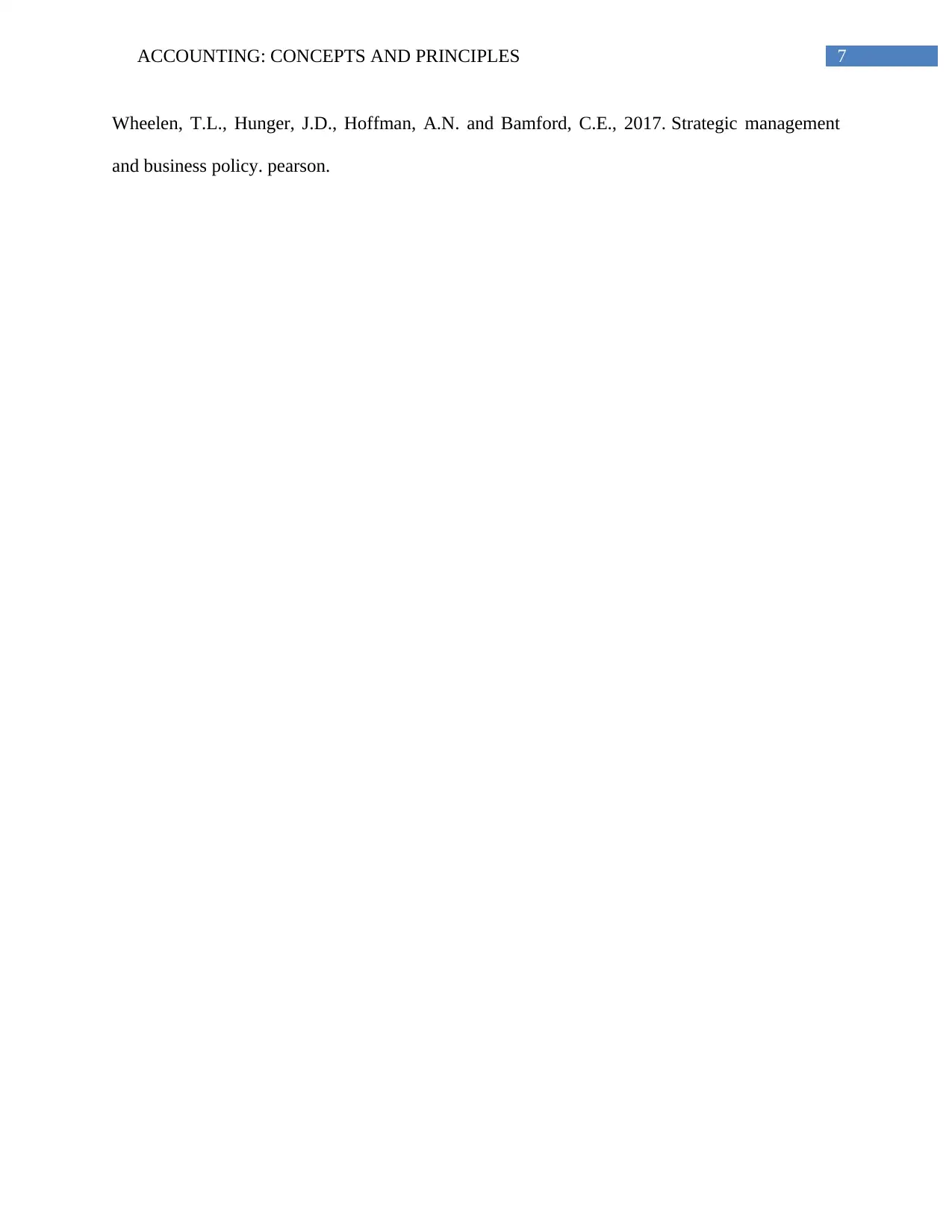
7ACCOUNTING: CONCEPTS AND PRINCIPLES
Wheelen, T.L., Hunger, J.D., Hoffman, A.N. and Bamford, C.E., 2017. Strategic management
and business policy. pearson.
Wheelen, T.L., Hunger, J.D., Hoffman, A.N. and Bamford, C.E., 2017. Strategic management
and business policy. pearson.
1 out of 8
Your All-in-One AI-Powered Toolkit for Academic Success.
+13062052269
info@desklib.com
Available 24*7 on WhatsApp / Email
![[object Object]](/_next/static/media/star-bottom.7253800d.svg)
Unlock your academic potential
Copyright © 2020–2026 A2Z Services. All Rights Reserved. Developed and managed by ZUCOL.
